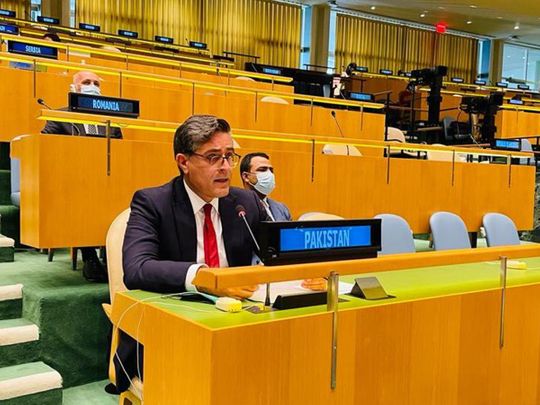
Islamabad: Pakistan has called for a new international order and concerted efforts especially by nuclear states to counter the growing security challenges.
“The global arms control order is in a state of virtual demise,” said Ambassador Khalil Hashmi, Pakistan’s permanent representative to the UN.
“This breakdown (in the order) is evident in several ways. Arms races, weaponization and integration across nuclear, outer space, cyber, conventional and AI (Artificial Intelligence) domains are in full swing. Long-standing rules and norms are being eroded…Consequently, political and military tensions, strategic asymmetries and nuclear dangers are growing” the ambassador informed the United Nations General Assembly’s First Committee which deals with disarmament and international security matters.
There are several worrying trends on the conventional weapons horizon, he warned. “Global military expenditures and international trade in conventional arms have reached unprecedented levels.”
Many of these troubling trends manifest in South Asia where the largest state, driven by its pursuit of regional hegemony and aided by generous supplies of conventional and non-conventional weaponry, continues to operationalize dangerous doctrines, he said. South Asia bears witness to deliberate stalling of Pakistan’s long-standing proposals for conventional balance in forces and armaments.
Addressing the security concerns of all states.
Fulfilling nuclear disarmament obligations.
Advancing conventional arms control.
Strengthening the non-proliferation regime by shunning double standards.
Legally binding negative security assurances to non-nuclear-weapon states.
Concluding legally binding instruments to fill the gaps in the international legal regime on outer space.
Ensuring that new and emerging technologies are not utilized to undermine regional or global strategic stability.
Outer space treaty
He also voiced alarms on the proliferation of space threats. “We are increasingly concerned by threats posed by anti-satellite capabilities to regional and global stability. [and] the potential integration of anti-ballistic missile systems and their components into space.” He stressed that the existing gaps in the outer space treaty have “grave security implications.”
He also said that the “development and potential deployment of autonomous weapons carry serious ramifications for international humanitarian law as well as regional and international peace and security.” Pakistani ambassador suggested that it is critical for the 6th Review Conference on Certain Conventional Weapons (CCW) later this year in Geneva to establish a robust, forward-looking and comprehensive process on lethal autonomous weapons systems (LAWS).
During this session, Pakistan will present its traditional draft resolution on conventional arms control, conventional confidence-building measures (CBMs) and regional disarmament, he added.








